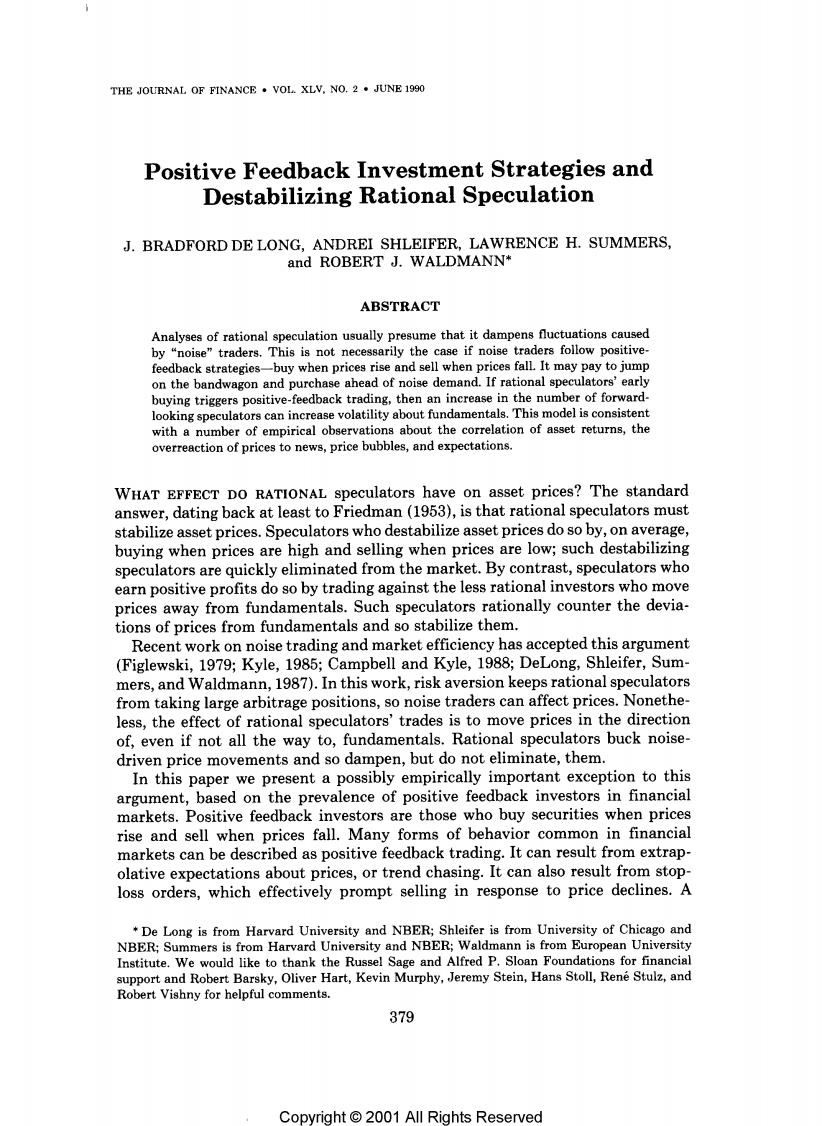正在加载图片...

THE JOURNAL OF FINANCE.VOL.XLV,NO.2.JUNE 1990 Positive Feedback Investment Strategies and Destabilizing Rational Speculation J.BRADFORD DE LONG,ANDREI SHLEIFER,LAWRENCE H.SUMMERS, and ROBERT J.WALDMANN* ABSTRACT Analyses of rational speculation usually presume that it dampens fluctuations caused by "noise"traders.This is not necessarily the case if noise traders follow positive- feedback strategies-buy when prices rise and sell when prices fall.It may pay to jump on the bandwagon and purchase ahead of noise demand.If rational speculators'early buying triggers positive-feedback trading,then an increase in the number of forward- looking speculators can increase volatility about fundamentals.This model is consistent with a number of empirical observations about the correlation of asset returns,the overreaction of prices to news,price bubbles,and expectations. WHAT EFFECT DO RATIONAL speculators have on asset prices?The standard answer,dating back at least to Friedman(1953),is that rational speculators must stabilize asset prices.Speculators who destabilize asset prices do so by,on average, buying when prices are high and selling when prices are low;such destabilizing speculators are quickly eliminated from the market.By contrast,speculators who earn positive profits do so by trading against the less rational investors who move prices away from fundamentals.Such speculators rationally counter the devia- tions of prices from fundamentals and so stabilize them. Recent work on noise trading and market efficiency has accepted this argument (Figlewski,1979;Kyle,1985;Campbell and Kyle,1988;DeLong,Shleifer,Sum- mers,and Waldmann,1987).In this work,risk aversion keeps rational speculators from taking large arbitrage positions,so noise traders can affect prices.Nonethe- less,the effect of rational speculators'trades is to move prices in the direction of,even if not all the way to,fundamentals.Rational speculators buck noise- driven price movements and so dampen,but do not eliminate,them. In this paper we present a possibly empirically important exception to this argument,based on the prevalence of positive feedback investors in financial markets.Positive feedback investors are those who buy securities when prices rise and sell when prices fall.Many forms of behavior common in financial markets can be described as positive feedback trading.It can result from extrap- olative expectations about prices,or trend chasing.It can also result from stop- loss orders,which effectively prompt selling in response to price declines.A De Long is from Harvard University and NBER;Shleifer is from University of Chicago and NBER;Summers is from Harvard University and NBER;Waldmann is from European University Institute.We would like to thank the Russel Sage and Alfred P.Sloan Foundations for financial support and Robert Barsky,Oliver Hart,Kevin Murphy,Jeremy Stein,Hans Stoll,Rene Stulz,and Robert Vishny for helpful comments. 379 Copyright O 2001 All Rights Reserved